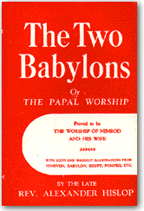 THE TWO BABYLONS (I-K)
THE TWO BABYLONS (I-K)

| A-B | C-H | I-K | L-Q | R-T | U-Z |
- Ichor:
- The bards of classical Greece used the word ichor when they referred to the blood of a divinity, showing their remembrance of the virtue of "the blood of God. "In Chaldean the word ichor signifies "The precious thing."
- Indra:
- "King of the gods" and god of the rain. Another form of Vishnu.
- Innus:
- Also, Enos, ancient Roman name of Pan, a generic name for fallen man.
- Ish-nuh:
- {SEE: Defintitions / Vishnu}
- Isis:
- Greek form of H’ isha, the woman.
- Janus:
- "The god of the gods", says of himself, "The ancients...called me Chaos." Proper name is Eanus. In ancient Chaldee E-anush signifies "the man, this name was applied to the Babylonian messiah to identify him with the promised seed of the woman. The Egyptian form is Ph’anesh. Represented as a two-headed god, "who had lived in two worlds."
- Jsha:
- "The woman".
- Juno:
- "Queen of Heaven", signifies "the Lady"; which in Greek, is Hera, "The dove" {SEE: Definitions/ Ops}
- Juno Covella:
- "The dove that binds with cords". On certain occasions, Romans combined their goddess’ titles of Juno and Khubele; hence, Juno Covello.
- Kamut:
- In Egypt: "husband of his mother". The name that Linus, or Osiris known as when referred to as "husband of his mother".
- Kentaur:
- [Chaldean] Also, Centaur (the c is hard, and so k), from kehn, "a priest", and tor, "to go around"; meaning "priest of the revolver". {SEE: Definitions/ Sun; Centauras}
- Khans:
- [Egyptian] "the huntsman". Comes from a word that signifies "to chase." {SEE: Definitions/ Consuls; Khans}
- Kheber:
- [Arabic] Also gheber, "The mighty one". In Chaldean the word is Aakbar. In Turkish and some other Eastern dialects became akbar, as in the Moslem saying "Allar Akbar", meaning "God is Great". (Synonym: Abir)
- Khesa or Khesha:
- [Chaldean] "gathering in grapes", and "fortifying", or more accurately, "to render inaccessible", from, BA, meaning "in", and tar, meaning "to compass".
- Khubby:
- signifies both "bind with cords", and also, "to travail in birth".
- Khubele:
- "The binder with cords", pronounced Sybil.
- Khaki-hold:
- "King of the world". Name of Nimrod as the universal king, as such his symbol was the bull’s horn. (Example: "the cuckold’s horn")
- Kissios:
- Greek name for Ivy and one of the names of Bacchus. From the Chaldean word khesa.
- Kon:
- Or Con. Means "laminator."
- Kronos:
- "The horned one". From krn, "a horn." Krn, the verb which kronnos comes from, signifies either "to put forth horns", or "to send forth rays of light". Nimrod was deified as "the horned one", and this name/title stuck in referenceto "the shiner" or "the light-giver".
- Kuanyin:
- Pagan mother goddess of the Chinese of Canton.
- Khuth:
- Or Khuath, Chaldean form of the Hebrew Khus, meaning "a cup."
Glossary | A-B | C-H | I-K | L-Q | R-T | U-Z |